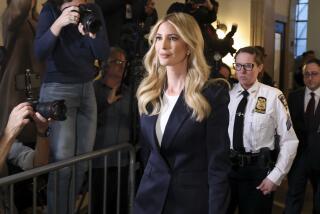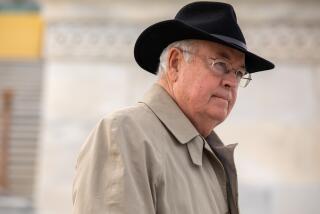The First Lady’s Credibility Gap : Investigations cast a shadow on her veracity
President Clinton’s biggest political problem this election year may not lie in the legislative and electoral challenges posed by his Republican critics and competitors, or in the potential dangers presented by U.S. involvement in Bosnia or developing events in Russia. His heaviest political burden might instead prove to be his wife, Hillary Rodham Clinton, whose credibility threatens to become an embarrassing political issue.
The evidence is now persuasive that Mrs. Clinton, supported by the testimony of friends and associates, has not been entirely candid when describing controversial events in her earlier professional life as a lawyer in Arkansas, and about the influence she has exercised in some matters since becoming First Lady. She has been questioned several times by the Whitewater special counsel. So far as is known, there is no case that she has violated any laws. But she has clearly appeared to obfuscate the truth regarding certain activities. At a minimum, she and some associates seem to have engaged in an elaborate spin-and-shade game, possibly to try to avoid personal or political embarrassment, possibly for reasons having more to do with the legal code than with partisanship.
The drawn-out investigation --touching on the Clintons’ investment in an Arkansas land deal, on another real estate project known as Castle Grande and on what matters Mrs. Clinton did or didn’t work on as a member of the Rose law firm in Little Rock--has been something less than a riveting source of excitement for most Americans. Still, the investigation has revealed some deeply disturbing contradictions as well as a passel of convenient memory lapses in what various principals have said either under oath or, as in Mrs. Clinton’s case, in published interviews. The inescapable impression is one of a calculated effort to distort or veil the truth.
Probably the strongest blow so far to Mrs. Clinton’s credibility has come, not out of the Whitewater matter, but with new evidence contradicting her earlier denials of any significant involvement in the firing of White House travel office personnel shortly after Clinton became president.
A freshly surfaced memo by David Watkins, a former White House chief of management and administration, makes it clear the firings came at Mrs. Clinton’s direction. The dismissals, aimed at providing patronage openings for Arkansas friends, involved especially nasty but never supported charges of corruption against the existing staff. As recently as last weekend, Mrs. Clinton denied being involved in the firings. The record suggests that she was in fact a prime mover.
It was one thing to distance herself from this debacle two years ago; it’s quite another to continue issuing denials in the face of documentary evidence to the contrary. Mrs. Clinton has a credibility problem. To fix it, she must quickly give full answers that don’t fall apart later upon closer inspection. Because while voters may not understand or care much about the intricacies of Whitewater, they do understand and care about what appears to be prevarication.
More to Read
Get the L.A. Times Politics newsletter
Deeply reported insights into legislation, politics and policy from Sacramento, Washington and beyond. In your inbox three times per week.
You may occasionally receive promotional content from the Los Angeles Times.










